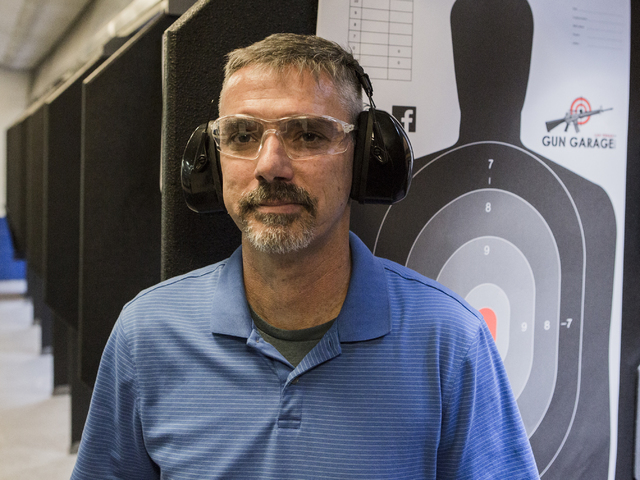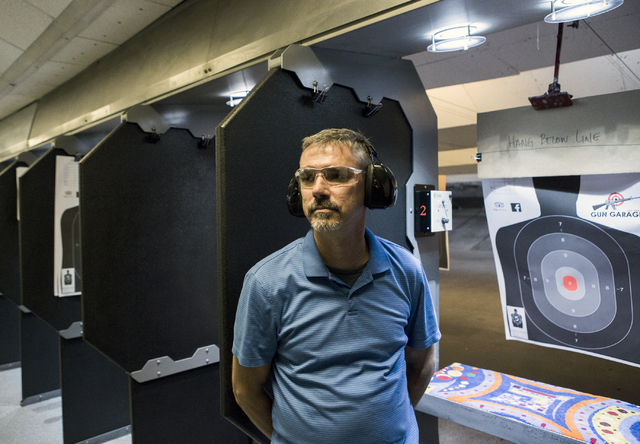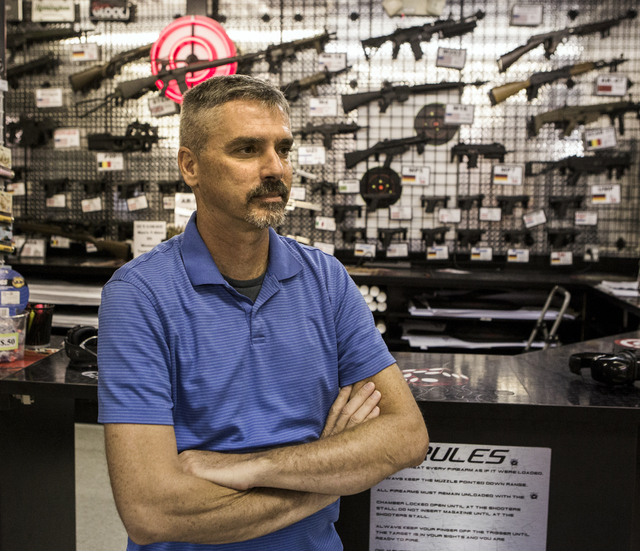Suicide prevention a lifelong cause for Southern Nevada facilitator
Veteran Richard Egan remembers joining the United States Air Force in 1986 during a period when the military branch was looking to reduce suicide rates among its officers. As Egan moved up in the ranks, his responsibility to support that effort grew as well.
In 2007, Egan, a Centennial Hills resident, was able to save the life of a fellow Air Force member who attempted suicide by paying close attention to warning signs and acting quickly. Now, as the Southern Nevada suicide prevention training and outreach facilitator for the Nevada Office of Suicide Prevention, he provides those same tips to his students.
Nevada has the fourth-highest suicide rate in the nation, according to the Suicide Prevention Resource Center. To reduce suicides in the state, the Office of Suicide Prevention, 3811 W. Charleston Blvd., holds five types of suicide prevention trainings : Youth Mental Health First Aid; safeTALK; suicideTALK; ASIST (Applied Suicide Intervention Skills Training); and Nevada Gatekeeper, to prepare health professionals and the average person who might encounter someone considering suicide.
The office offers the trainings for a reduced fee and the Youth Mental Health First Aid course free. All of the public trainings are available to those 15 or older. For more information, visit the Nevada Coalition for Suicide Prevention at nvsuicideprevention.org.
“When we have community members that are aware of what they can do when they suspect suicide, they can help that person get resources,” Egan said. “Ultimately, it’s up to that person to make sure that they take care of themselves, but the more community members that are available, the more people that can get involved.”
Egan, 50, found his job unexpectedly after he forwarded the application to his wife, Pamela, who realized it was a perfect fit for him instead. Egan had served as a munitions systems specialist for 26 years and said his work then revolved around bombs and bullets.
In his current role, he said he has found a new direction in life but with a familiar purpose.
“The Air Force taught me to give back to your community and people whenever you can,” he said.
Egan said he tries to make all his suicide prevention trainings interactive, but most important for him is that they are safe spaces. Sometimes, participants are people who have lost someone to suicide or are even contemplating it themselves.
Howard Scheff, a firearms instructor with Safe Directions Firearms Training, is all too aware of the prevalence of suicide. Fifteen years ago, a friend committed suicide moments after Scheff left his home.
Scheff, also an Air Force veteran, frequently encounters fellow veterans who struggle with suicidal thoughts. Even though Scheff extended his support, he said before undergoing Egan’s trainings, he didn’t know the right thing to say or do in a situation like that.
“I could go talk to them and hope that I could get through to them, tell them I care about them, but without having resources or any kind of training, to me, how to deal with that person, it didn’t work,” Scheff said.
Egan teaches his students to ask straightforwardly if someone is considering suicide if they see warning signs and to then develop a plan to get the person to safety and connect them to the right medical resources.
Seven months after completing two courses, Scheff has used his training to help three people, two of them veterans, and one in the desert during a shooting practice.
With a number of recent suicide-related incidents at Las Vegas-area shooting ranges, Scheff said he suspects his training might come in handy at his work one day. According to the Office of Suicide Prevention, over 55 percent of suicide-related deaths in Nevada involve a firearm.
As a gun owner himself, Egan has become a bridge between gun shops and shooting ranges and the Office of Suicide Prevention, reaching out to gun-related businesses and attending gun shows to offer the knowledge necessary to spot a customer thinking of using a gun on himself.
He also works to raise awareness among gun owners of the importance of limiting access to firearms when they are not in use.
Egan said that since his office began reaching out to gun-related businesses, there are over 100 trained gun store and range employees and several store managers in Las Vegas who have undergone the suicide prevention training.
Egan also continues to serve his community in his spare time, working as a volunteer for the Trauma Intervention Program (TIP) of Southern Nevada, giving emotional and practical support to families experiencing a crime or tragedy at least three times a month for 12-hour shifts.
Egan happened to be on call when fellow veteran and longtime friend Calvin Milling’s daughter died last year. Emergency dispatchers sent Egan to the scene, but because he knew Milling, there was no need for introduction or formalities.
Milling said he continued to depend on Egan for moral support afterward. He considers Egan to be a dependable and selfless friend.
“He looks more to help others than try to help himself,” Milling said. “You don’t get that very often here in Vegas. People are often focused on themselves, but Richard served his country, and he continues to serve his community.”
To reach the National Suicide Prevention Lifeline, call 800-273-8255. To reach the Southern Nevada Office of Suicide Prevention, call 702-486-8225.
To reach View reporter intern Rocio Hernandez, email rhernandez@reviewjournal.com or call 702-387-5233. Find her on Twitter: @rociohdz19.
Office of Suicide Prevention
Address: 3811 W. Charleston Blvd.
For information about suicide prevention trainings, call 702-486-8225.
To reach the National Suicide Prevention Lifelife, call 800-273-8255.




















